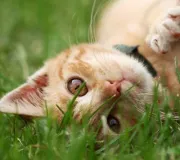Did you know that our feline friends can get their own version of colds or flus? In many cases, cats just feel a bit stuffy and tired for a few days, and then recover on their own. However, kitty colds can develop into upper respiratory infections, or URIs. These can be extremely dangerous! Senior cats and kittens are especially at risk, because of their weaker immune systems. A vet discusses cat colds below.
Warning Signs
Keep an eye out for warning signs. Lethargy is a common one. If Fluffy is stuffed up, she may sleep even more than usual. Some other red flags include coughing, sneezing, fever, runny nose, watery eyes, reduced food and/or water intake, wheezing, and/or difficulty breathing. Contact your vet right away if you notice any of these symptoms.
Medicine
Once Fluffy has been properly diagnosed, your vet will be able to give you specific treatment options. These may include antibiotics and/or other medications. In some cases, your veterinarian may recommend advanced Veterinary Diagnostics, such as blood tests or x-rays, to determine the underlying cause of your cat’s cold and develop an appropriate treatment plan. Never give Fluffy human medications, unless your vet specifically recommends it. This applies to home remedies too. Things like garlic, whiskey, and turmeric, which are in many of Grandma’s old home remedies, might work for us but are extremely dangerous for our furry friends!
Home Care
Believe it or not, Fluffy may enjoy a bit of chicken soup. Skip the garlic, onions, rice, and pasta: warm, sodium-free chicken broth with some plain, boneless chicken (and perhaps some peas and carrots) is fine. Some kitties like having their canned food warmed up a bit. You can also put a humidifier on and/or bring your feline pal into the bathroom while you shower, so she can breathe the steam. You may want to get your cat a new bed or a comfy throw blanket to curl up in. You’ll also need to make sure your furry buddy is drinking lots of water. Of course, cuddles and ear scritches are on the agenda as well.
Preventing Colds
As the saying says, an ounce of prevention is worth a pound of cure. First and foremost, keep up with Fluffy’s vaccinations, such as the vaccine for feline calcivirus. Keep in mind that cats can still spread the virus after they have recovered. Keeping your kitty indoors will reduce the odds of her coming into contact with infected felines.
While colds are common in cats, it’s important to remember that our feathered friends can also suffer from respiratory issues. To learn more about the causes, symptoms, and treatment of Respiratory Infections in Birds, read our informative article.
Do you have questions about cat colds? Contact us, your local vet clinic in St. Lucie County, FL, today!

